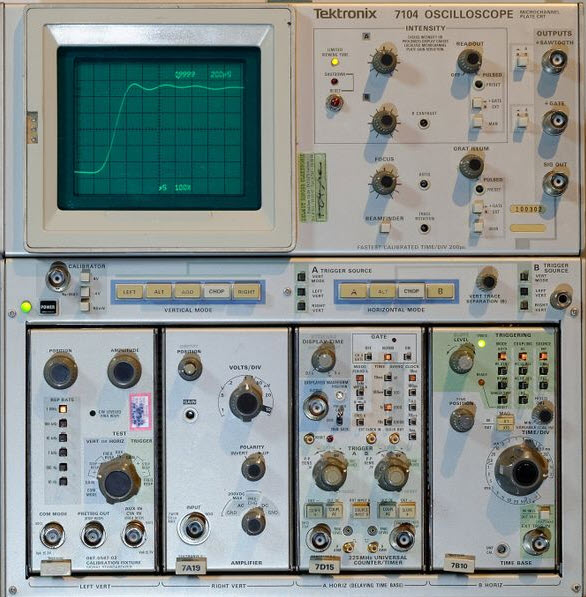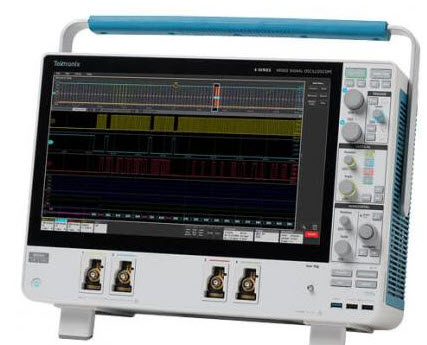 |
Jack Ganssle's Blog This is Jack's outlet for thoughts about designing and programming embedded systems. It's a complement to my bi-weekly newsletter The Embedded Muse.
Contact me at jack@ganssle.com. I'm an old-timer engineer who still finds the field endlessly fascinating (bio).
This is Jack's outlet for thoughts about designing and programming embedded systems. It's a complement to my bi-weekly newsletter The Embedded Muse.
Contact me at jack@ganssle.com. I'm an old-timer engineer who still finds the field endlessly fascinating (bio). |
On USB v. Bench Instruments
July 31, 2018
Over the years I've used a lot of different pieces of test equipment. These broadly fall into two categories: bench instruments (stand-alone with controls and displays) and USB devices. The latter generally have no knobs, buttons or displays, those functions relegated to an application running on a PC.
Which do you prefer?
When I was a young engineer a really great Tektronix scope had a 5" screen. Bigger displays have always been one of the holy grails of oscilloscopes, and today, Tektronix's Series 6 scopes sport a stunning 15.6" display.
Compare a 70s-era Tek 7000 scope:

To the new Series 6:

Once a scope was all knobs; today some are all displays. Since our goal is to see the signals, bigger is better.
A USB scope can have as big of a screen as you'd like. Heck, connect an LCD projector and get a 6 foot image. But even without that extreme, most of us have pretty decent-sized monitors, far exceeding the 15.6" Tek monster.
Some scopes have touchscreens now. That's pretty nifty. My arbitrary waveform generator has one but I find it easier to use the knobs. I tried a Rohde & Schwarz scope recently and didn't care for the touchscreen; it seemed more natural and less jerky to use the controls. My wife's computer has a touchscreen which I loathe, as every time I point something out to her my finger causes the computer to do something unexpected.
Yet some are pretty good. My Siglent SDS5034X's touchscreen works brilliantly.
While you just can't beat the screen size available with a USB instrument, I find the device under test is usually to the left or right of my computer because the keyboard is in the way, so it's a little unnatural to have to look so far away from the equipment I'm probing to see the display.
The form factor of a USB instrument is fantastic - those units take up practically no bench space. Modern bench scopes all have switching power supplies so weigh little, but the USB equivalent practically floats like a feather. Toss one in your briefcase for travel and TSA might be curious, but you'll still have room for a laptop and the latest Steven King blockbuster. A bench version is its own carry-on.
Bench scopes have gotten so lightweight that there is a new problem: a BNC probe needs firm pressure to connect. The scope then slides back on the bench until it hits the wall or falls off. You need one hand to steady the instrument. I've screwed a block of wood behind my main oscilloscope to keep it from moving, permitting one-handed connections.
In general, the USB versions have much worse specs than their bench brethren. There aren't many 100 MHz versions, with the notable exception of Pico.
Then there's cost. Some of the USB instruments are under $100... though their specs are such that they probably aren't much use for embedded work. But that price is unbeatable for educational purposes or audio efforts. Yet the Chinese are offering some bench scopes for astounding prices. Rigol and Siglent both offer two channel very nice 100 MHz scopes for just $300.
But what about knobs? I like having knobs. When holding a probe in one hand, another in your mouth, you can reach up and quickly change the time base without much effort. Mousing around to do the same thing on a GUI requires more agility. With a bench scope you are probably looking down at the device being tested and the scope a few inches beyond; even with bifocals switching focus between the two is easy. It's tougher to hold those probes on that SMT part and then look way over at the PC's screen.
On the other hand, some scopes have so many controls that I have trouble finding the right one. With aging eyes it isn't easy to read the small on-knob print to locate a not-often-used function.
Personally, I favor bench instruments. But very good arguments can be made for a USB version, and I do keep one of those on the boat.
But is anything cooler than a lab bench bristling with fancy test equipment with flashing lights and big displays?
Feel free to email me with comments.
Back to Jack's blog index page.
If you'd like to post a comment without logging in, click in the "Name" box under "Or sign up with Disqus" and click on "I'd rather post as a guest."
Recent blog postings:
- Non Compos Mentis - Thoughts on dementia.
- Solution to the Automotive Chip Shortage - why use an MCU when a Core I7 would work?
- The WIRECARE - A nice circuit tester
- Marvelous Magnetic Machines - A cool book about making motors
- Over-Reliance on GPS - It's a great system but is a single point of failure
- Spies in Our Email - Email abuse from our trusted friends
- A Canticle for Leibowitz - One of my favorite books.
- A 72123 beats per minute heart rate - Is it possible?
- Networking Did Not Start With The IoT! - Despite what the marketing folks claim
- In-Circuit Emulators - Does anyone remember ICEs?
- My GP-8E Computer - About my first (working!) computer
- Humility - On The Death of Expertise and what this means for engineering
- On Checklists - Relying on memory is a fool's errand. Effective people use checklists.
- Why Does Software Cost So Much? - An exploration of this nagging question.
- Is the Future All Linux and Raspberry Pi? - Will we stop slinging bits and diddling registers?
- Will Coronavirus Spell the End of Open Offices - How can we continue to work in these sorts of conditions?
- Problems in Ramping Up Ventilator Production - It's not as easy as some think.
- Lessons from a Failure - what we can learn when a car wash goes wrong.
- Life in the Time of Coronavirus - how are you faring?
- Superintelligence - A review of Nick Bostrom's book on AI.
- A Lack of Forethought - Y2K redux
- How Projects Get Out of Control - Think requirements churn is only for software?
- 2019's Most Important Lesson. The 737 Max disasters should teach us one lesson.
- On Retiring - It's not quite that time, but slowing down makes sense. For me.
- On Discipline - The one thing I think many teams need...
- Data Seems to Have No Value - At least, that's the way people treat it.
- Apollo 11 and Navigation - In 1969 the astronauts used a sextant. Some of us still do.
- Definitions Part 2 - More fun definitions of embedded systems terms.
- Definitions - A list of (funny) definitions of embedded systems terms.
- On Meta-Politics - Where has thoughtful discourse gone?
- Millennials and Tools - It seems that many millennials are unable to fix anything.
- Crappy Tech Journalism - The trade press is suffering from so much cost-cutting that it does a poor job of educating engineers.
- Tech and Us - I worry that our technology is more than our human nature can manage.
- On Cataracts - Cataract surgery isn't as awful as it sounds.
- Can AI Replace Firmware - A thought: instead of writing code, is the future training AIs?
- Customer non-Support - How to tick off your customers in one easy lesson.
- Learn to Code in 3 Weeks! - Firmware is not simply about coding.
- We Shoot For The Moon - a new and interesting book about the Apollo moon program.
- On Expert Witness Work - Expert work is fascinating but can be quite the hassle.
- Married To The Team - Working in a team is a lot like marriage.
- Will We Ever Get Quantum Computers - Despite the hype, some feel quantum computing may never be practical.
- Apollo 11, The Movie - A review of a great new movie.
- Goto Considered Necessary - Edsger Dijkstra recants on his seminal paper
- GPS Will Fail - In April GPS will have its own Y2K problem. Unbelievable.
- LIDAR in Cars - Really? - Maybe there are better ideas.
- Why Did You Become an Engineer? - This is the best career ever.
- Software Process Improvement for Firmware - What goes on in an SPI audit?
- 50 Years of Ham Radio - 2019 marks 50 years of ham radio for me.
- Medical Device Lawsuits - They're on the rise, and firmware is part of the problem.
- A retrospective on 2018 - My marketing data for 2018, including web traffic and TEM information.
- Remembering Circuit Theory - Electronics is fun, and reviewing a textbook is pretty interesting.
- R vs D - Too many of us conflate research and development
- Engineer or Scientist? - Which are you? John Q. Public has a hard time telling the difference.
- A New, Low-Tech, Use for Computers - I never would have imagined this use for computers.
- NASA's Lost Software Engineering Lessons - Lessons learned, lessons lost.
- The Cost of Firmware - A Scary Story! - A hallowean story to terrify.
- A Review of First Man, the Movie - The book was great. The movie? Nope.
- A Review of The Overstory - One of the most remarkable novels I've read in a long time.
- What I Learned About Successful Consulting - Lessons learned about successful consulting.
- Low Power Mischief - Ultra-low power systems are trickier to design than most realize.
- Thoughts on Firmware Seminars - Better Firmware Faster resonates with a lot of people.
- On Evil - The Internet has brought the worst out in many.
- My Toothbrush has Modes - What! A lousy toothbrush has a UI?
- Review of SUNBURST and LUMINARY: An Apollo Memoir - A good book about the LM's code.
- Fun With Transmission Lines - Generating a step with no electronics.
- On N-Version Programming - Can we improve reliability through redundancy? Maybe not.
- On USB v. Bench Scopes - USB scopes are nice, but I'll stick with bench models.

